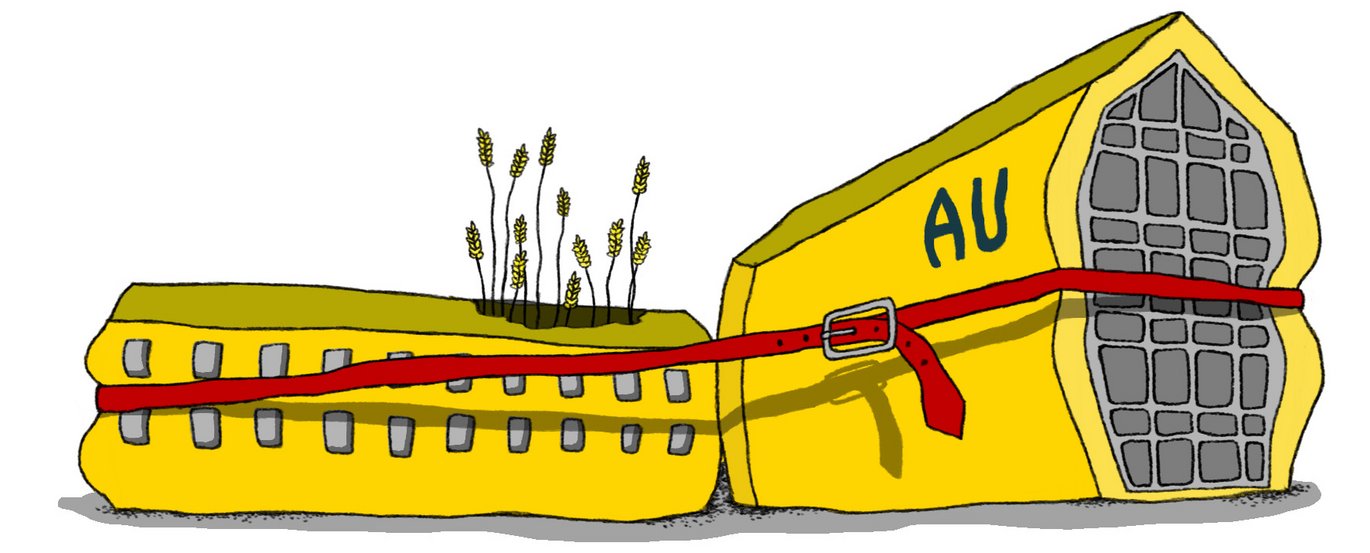Employees in the administration are not optimistic about the future
University Director Arnold Boon believes that the management at the administration has a job to do when it comes to clarifying tasks and more efficient ways of doing them. Whereas union representatives point to the lack of clear career paths and an underlying fear of being fired as the primary reasons for the less than optimistic tones from the administrative staff when it comes to the future.


In its review of the WPA report for the administration, it has not escaped Arnold Boon’s attention that administrative members of staff are not optimistic about the future.
The employees at AU Student Administration and Services are the least optimistic about the future. Thirty-one percent
totally or partly disagree that they are happy with their job prospects. In the Rector’s Office the equivalent figure is 25 per cent. By comparison, the figure for all employees at AU is 24 per cent.
Certainly understands the sense of doubt
The university director can certainly understand those employees who are in doubt about their job prospects, but he still believes that Aarhus University is in a really good position to deal with the future.
"But the management has the task of discussing future job prospects with the employees and helping to visualise the future," says Boon.
Constant underlying fear of being fired
In the opinion of Anne Vedsted Hansen, who is the joint union representative for AC-TAP staff in AU Student Administration and Services, the sombre outlook is due to two factors. One thing is that AU Student Administration and Services has experienced two rounds of dismissals.
"More cutbacks still hang over our heads like heavy clouds for the next few years. I find that some employees have developed an embedded fear of being fired in the next round of dismissals. They keep their heads down and don’t say anything about problems because no one wants to be seen as a troublemaker," says Anne Vedsted Hansen and continues:
"Dismissing employees has such a complex effect on the organisation that I simply can’t understand how you can do it time and time again. It also has another result, which is that the WPA shows that 15 per cent of the employees at AU Student Administration and Services would not recommend their workplace to others."
Employees lack opportunities for career development
According to the union representative, another reason why the employees take such a sombre view is that there are not always clear career paths for the administrative staff – if, indeed, there are any at all.
"You can take a step to the left or a step to the right, but there is not really a step forward, unless you want to get into management. I think AU needs to be better at developing competences in time, so we won't need to fire more employees, but can manage the cost reductions over the coming year through voluntary resignations and relocations," says Hansen.
Insecure colleagues in AU Student Administration and Services
Helle Colding Seiersen is the union representative for National Union of Commercial and Clerical Employees (HK) at AU Student Administration and Services. She also believes that restructuring, cost reductions and the lack of potential for seeing the next career move underlie colleagues' pessimistic view of their job prospects.
"We experience our work in the administration as very labour-intensive. Together with the lack of defined and clear career paths, employees easily end up feeling that they’re just stuck where they are."
What needs to be done?
As an example of the type of things that help nurture this feeling, Seiersen mentions the recent pay negotiations in the administration.
"When I’m at pay negotiations, I want to know what needs to be done for my colleagues to receive more in their pay packet. But I find it difficult to get answers from the management, because we don't have a competence strategy for administrative staff at AU."
Seiersen therefore has the following proposal for securing a more optimistic view of the future among her colleagues: bring some clarity to their future prospects.
"If we had career paths that were just as clear as those for the academic staff, then I think that many people would be more optimistic in general,” she says
Mergers and cutbacks
In the opinion of Jesper Bo Jensen, who is joint union representative for AC-TAP staff in the Rector's Office, employees here also have a view of future job prospects that is influenced by years of repeated cutbacks which look like continuing in the future.
"We are the result of the fusions and fissions after the mergers following the problem analysis. Half of the department consists of employees from what was AU Communication, which was merged into the senior management team almost eighteen months ago. This group of employees has experienced a period of three to four years with several rounds of cutbacks, which of course plays a role," explains Jensen.
He adds:
"When the WPA questionnaire was sent out, we were in the final phase of an analysis of communications. A lot has happened since then, and several things have fallen into place here in the department. Both in relation to coming communication tasks and in relation to finances. In general, Arnold Boon has been good at creating clearer strategic priorities and at including the employees. He has addressed the coming cutbacks – or decline in revenue, if you prefer – instead of not making any announcements over long periods."
The university cannot avoid future cutbacks, but the way in which management deals with them is crucial for how the employees experience them, says Jensen.
Improvements – but the figures are still too high
The last psychological WPA from 2012 made for ugly reading for managers in the administration, where a third of the employees felt exhausted, and a fifth had severe stress symptoms. There has been a significant improvement since then, but one in five feel exhausted, and one in ten have severe stress symptoms.
University Director Arnold Boon sees reasons for being pleased about the positive development, but still thinks the figures are too high.
"We need to be attentive to what we as managers, employees and colleagues can do to spot when an employee and a colleague is reaching their tipping point, so we can in this way prevent or anticipate stress. But we must also talk about what we can do if someone has gone beyond this tipping point," he says.
Relieve some of the pressure
Boon will not present specific proposals. He believes any follow-up must take place in the individual departments, as they are close to the problem.
"But my general position is that you can prevent stress by ensuring clarity about the tasks that someone has and by seeing whether processes and procedures can be optimised. My expectation is that these measures can help relieve some of the pressure in employee’s everyday work and thus improve the work environment," explains Boon.
Cutting back on duties is not the answer
The university director holds the same position when it comes to the employees' overtime. One-third of the technical and administrative staff at AU work significantly more than the agreed working hours. Many state that they work overtime because they do not have the time to perform their duties within the agreed working hours, and that there is nobody else to take over their duties.
"This is an issue which I'm very aware of. One of the solutions is to find smarter ways of carrying out work rather than just cutting back on duties," says Boon.
Translated by Peter Lambourne

